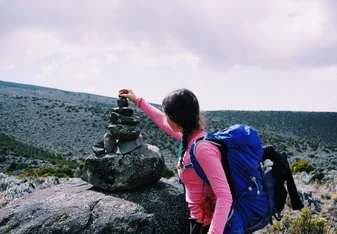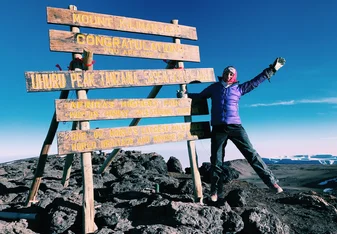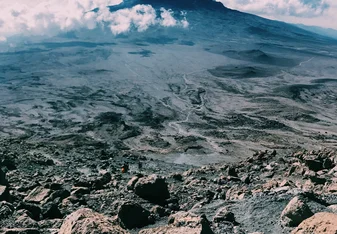Why did you choose this program?
I have always been intrigued by mountains, life in the wild, and the environment. The books I read are overwhelmingly wilderness and mountain climbing books, and each book I read becomes a dream for a future adventure.
My favorite summers have been spent with Outward Boud backpacking in the Colorado Rockies, and the weeks I spent living in beautiful mountain ranges developed my deep love for the outdoors.
I enjoy putting myself outside of my comfort zone, especially while traveling and learning, so when I discovered Rustic Pathways offered a trip to climb Mount Kilimanjaro, clicking the "sign up" button was an easy and obvious decision. I knew climbing Kilimanjaro would be difficult, but I was immensely excited for the challenge and adventure.
What did your program provider assist you with, and what did you have to organize on your own?
Rustic Pathways provided students with a packing list and itinerary. I had to do independent research on the best gear to use and how to train for the climb.
Going into your experience abroad, what was your biggest fear, and how did you overcome it? How did your views on the issue change?
My biggest fear was traveling without a friend or family member because I thought I would need their support to get the most out of my experience. To my surprise, I found that traveling alone was the best way to branch out and immerse myself. I was able to make new connections with people that I would not have approached if I was with a friend.
Traveling by myself taught me to be resilient and independent, and I was able to share my experiences when I returned from Tanzania.
What is one piece of advice you'd give to someone going on your program?
Your time spent on Kilimanjaro will not just be physically demanding. More so, the climb will be an emotional ride. You will be in a new country, with people you have never met, eating different food, all while being at high altitude.
You need to have a positive mind set, especially during the final push to the summit because it can get lonely, discouraging, and uncomfortable to hike in the freezing night with limited oxygen. The climb is challenging, but stay optimistic, take in the unbelievable views, and connect with your group and the locals.
Do not dwell on the miles you know you have to hike, take it one step at a time. Absorb every moment, take pictures when you have the energy, and bring snacks!
What does an average day/week look like as a participant of this program?
You will wake up as the sun rises by friendly Tanzanian porters. As you collect yourself and remember you are actually on Mount Kilimanjaro, you will simultaneously pack your sleeping back and backpack. After breakfast a day long hike awaits.
The locals will sing traditional songs on the trek, and they will say "pole pole," which means "slowly, slowly" in Swahili, every chance they get. The leaders are reminding you of the importance of keeping a slow walking pace in high altitude.
You will be in awe of the beauty that surrounds you, and you will share wonderful memories with your group. After you arrive at the destination, you will eat dinner and go to sleep.
Describe the final summit push, and how did you feel when you reached the top of Mount Kilimanjaro?
The final summit attempt begins at 11:00 pm at 15,000 ft above sea level. I was freezing, exhausted, and nauseous from the altitude, but I did not let myself consider turning around. The only source of light I had was my headlamp, the trillions of stars, and the yellow crescent moon.
Each step ached and brought me completely out of breath, no matter how slow I hiked. Before I had the opportunity to drink or eat, the water I packed was frozen, and the thought of food made me nauseous, so all I could do was put one foot in front of the other.
Eventually, the sun rose, exposing the widest horizon I had ever seen, and turning the snow covered world pink. I knew I was almost at the top, but I also felt my energy rapidly draining. At 7:30 am, I saw the summit, and left my group behind as I exponentially increased my pace. I was the first one to touch the sign at the top, and with tears streaming down my face, congratulated the rest of the group as they summited.
I was proud, elated, but also wished to get to a lower elevation. At 19,341 ft it is hard to feel your best, but the summit made me the happiest I have ever been. I could not believe what I had just accomplished.
After a few pictures, I began the hike that would last another twelve hours to get to a lower elevation. I was in a state of shock at the top, but I soon realized that reaching the summit proved my strength, power, and drive.
Climbing Kilimanjaro was life changing, and it made me believe in my abilities as a young female.


